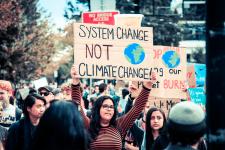What is Denmark’s role in realising the European Green Deal?

The European Green deal is the EU’s overall strategy which aims to provide a concrete action plan of the steps needed to make the EU climate neutral in 2050.
To better understand this challenge, the European Council on Foreign Relations asked policymakers, analysts, and opinion-shapers in all 27 EU capitals about climate issues. The audit concluded that EU member states are publicly committed to the European Green Deal but are divided over the details of its implementation. It also finds that the EU needs a strong foreign policy strategy to manage the geopolitical dimension of the deal and to generate the political resolve to drive climate action.
DIIS Researcher Christine Nissen and PhD fellow at Copenhagen University Jakob Dreyer contributed with the Danish analysis:
The case of Denmark

What does Denmark think of the European Green Deal?
Denmark is one of the few member states in which the European Green Deal received some coverage in the national media, particularly when it was presented and during the negotiations about the EU’s 2030 goal of cutting emissions by 55 per cent from 1990 levels.
There is an emerging consensus across political lines regarding the need to ‘do more’ on the overall issue of climate change. And Denmark has been a leader in pushing the EU’s climate goals further and faster. Denmark’s smaller left-wing parties demand a more proactive Danish role in climate issues and for the country to encourage the EU to adopt a more ambitious climate policy. This is even the case for the otherwise Eurosceptic party, the Red-Green Alliance, which promotes action on climate within the EU framework.
However, Denmark has a small, open economy that is not highly diversified and depends heavily on European and global export markets. So, some Danish policymakers and diplomats have political concerns about climate policy – particularly in relation to the EU’s proposed carbon border adjustment mechanism, which they fear could undermine free trade, to the detriment of Danish exports and jobs.
What is the main driver of Denmark’s thinking on the climate agenda?
Climate policy is a top priority for Denmark’s social democratic government. And there is widespread support for this across the political spectrum and public opinion. The Danish climate strategy, which has become law with broad parliamentary support, includes targets to reduce carbon emissions by 70 per cent by 2030 and to achieve carbon neutrality by 2050.
The climate minister, Dan Jorgensen, is a key voice in the national debate, as is civil society. But various actors from the private sector, including renewable energy companies such as Vestas and Orsted, have also been very active in shaping the Danish debate on climate policy and arguing that Denmark should be a proactive player on international climate policy. At the other end of the spectrum is a “black wing” of heavy, energy-intensive companies such as those in the agricultural and food industries.
What is the strongest argument for driving up ambition in Denmark?
While Denmark – along with the other Nordic EU member states – has a long tradition of setting standards in European environmental regulation, a national impetus drives the Danish government’s climate strategy. Climate action is a top priority for voters, with Denmark a pioneer in wind energy, and with Orsted and Vestas as global companies helping facilitate the transition to sustainable energy. As such, the national climate effort is driven by both political identity and economic interests.
The private sector views the EU as essential on the climate question, due to the importance of the single market to most major Danish businesses. The growth of Denmark’s big sustainable energy industry is dependent on exports. And many Danish companies in other sectors lead the market on energy efficiency. However, Denmark’s heavier industries, and its large and politically influential agricultural sector, are more inclined to drag their feet on climate issues. The Danish media cover the EU’s role in climate action (as well as other policy areas), but not to a great extent. Such coverage has taken a further hit due to the covid-19 crisis and, where it does appear, mostly emphasises Denmark’s domestic emissions-reduction goals. Despite the crisis, climate action remains the most important political issue for Danish voters. Although they level their main critique of passivity on climate issues at national politicians, most of them say that the EU has not been sufficiently active on climate change.
How can Denmark best add value to the impact of the European Green Deal?
For the Danish economy, sustainable energy is an important and growing market, accounting for around €13 billion in exports in 2019. Therefore, Denmark hopes that European countries transitioning to green energy will generate further growth in the sector. Similarly, climate policy is part of Denmark’s international brand, formulated in its national strategy and implemented through several climate partnerships around the world. Although Danish companies seek to take advantage of available EU funding, Denmark’s status as a net contributor to the EU budget makes increased EU funding a relatively unattractive strategy for the national government.
DIIS Experts

